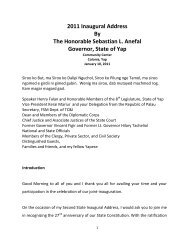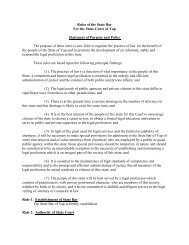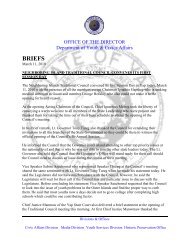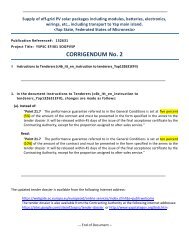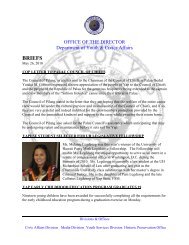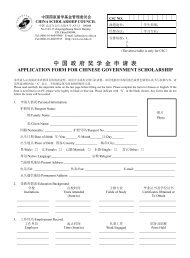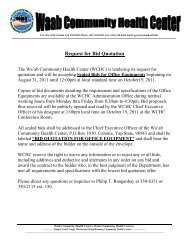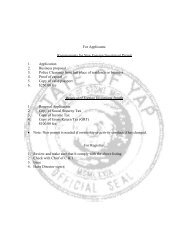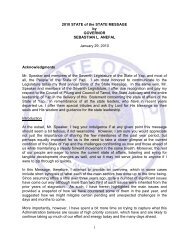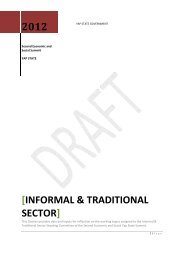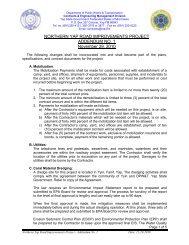RULES OF CIVIL PROCEDURE For the Trial Division of the Yap ...
RULES OF CIVIL PROCEDURE For the Trial Division of the Yap ...
RULES OF CIVIL PROCEDURE For the Trial Division of the Yap ...
Create successful ePaper yourself
Turn your PDF publications into a flip-book with our unique Google optimized e-Paper software.
<strong>the</strong> filing <strong>of</strong> <strong>the</strong> affidavits caused him to incur, including reasonable attorney or trial<br />
counselor fees, and any <strong>of</strong>fending party, counsel may be adjudged guilty <strong>of</strong> contempt.<br />
Rule 57. Vacant. (Declaratory Judgment)<br />
Rule 58. Entry <strong>of</strong> Judgment. Subject to <strong>the</strong> provisions <strong>of</strong> Rule 54(b): (1) upon a<br />
decision by <strong>the</strong> court that a party shall recover only a sum certain or costs or that all relief<br />
shall be denied, <strong>the</strong> court shall promptly prepare, sign, and enter <strong>the</strong> judgment; (2) upon a<br />
decision by <strong>the</strong> court granting o<strong>the</strong>r relief, <strong>the</strong> court shall promptly approve <strong>the</strong> form <strong>of</strong><br />
<strong>the</strong> judgment, and <strong>the</strong> clerk shall <strong>the</strong>reupon enter it. A judgment is effective only when<br />
entered as provided in Rule 79(a). Entry <strong>of</strong> <strong>the</strong> judgment shall not be delayed for <strong>the</strong><br />
taxing <strong>of</strong> costs. Attorneys or trial counselors shall submit forms <strong>of</strong> judgment upon<br />
direction <strong>of</strong> <strong>the</strong> court.<br />
Comment: Rule 58 has been modified to comport with <strong>the</strong> amended Rule 55. The<br />
clerk is no longer required to enter default judgment for sums certain.<br />
Rule 59. New <strong>Trial</strong>s; Amendment <strong>of</strong> Judgments.<br />
(a) Grounds. Anew trial may be granted to all or any <strong>of</strong> <strong>the</strong> parties and on all or part<br />
<strong>of</strong> <strong>the</strong> issues for manifest error <strong>of</strong> law or fact, or for newly discovered evidence. On a<br />
motion for a new trial <strong>the</strong> court may open <strong>the</strong> judgment if one has been entered, take<br />
additional testimony, amend findings <strong>of</strong> fact and conclusions <strong>of</strong> law or make new<br />
findings and conclusions, and direct <strong>the</strong> entry <strong>of</strong> a new judgment.<br />
(b) Time for Motion. A motion for a new trial shall be served not later than IO days<br />
after <strong>the</strong> entry <strong>of</strong> <strong>the</strong> judgment.<br />
(c) Time for Servicing Affidavits. When a motion for new trial is based upon<br />
affidavits <strong>the</strong>y shall be served with <strong>the</strong> motion. The opposing party has 10 days after such<br />
service within which to serve opposing affidavits, which period may be extended for an<br />
additional period not exceeding 20 days ei<strong>the</strong>r by <strong>the</strong> court for good cause shown or by<br />
<strong>the</strong> parties by written stipulation. The court may permit reply affidavits.<br />
(d) On Initiative <strong>of</strong> Court. Not later than 10 days after entry <strong>of</strong> judgment <strong>the</strong> court <strong>of</strong><br />
its own initiative may order a new trial for any reason for which it might have granted a<br />
new trial on motion <strong>of</strong> a party. After giving <strong>the</strong> parties notice and an opportunity to be<br />
heard on <strong>the</strong> matter, <strong>the</strong> court may grant a motion for a new trial, timely served, for a<br />
reason not stated in <strong>the</strong> motion. In ei<strong>the</strong>r case, <strong>the</strong> court shall specify in <strong>the</strong> order <strong>the</strong><br />
grounds <strong>the</strong>refor.<br />
(e) Motion to Alter or Amend a Judgment. A motion to alter or amend <strong>the</strong> judgment<br />
shall be served not later than 10 days after entry <strong>of</strong> <strong>the</strong> judgment.<br />
Rule 60. Relief from Judgment or Order.<br />
(a) Clerical Mistakes. Clerical mistakes in judgments, orders or o<strong>the</strong>r parts <strong>of</strong> <strong>the</strong><br />
record and errors <strong>the</strong>rein arising from oversight or omission may be corrected by <strong>the</strong>



